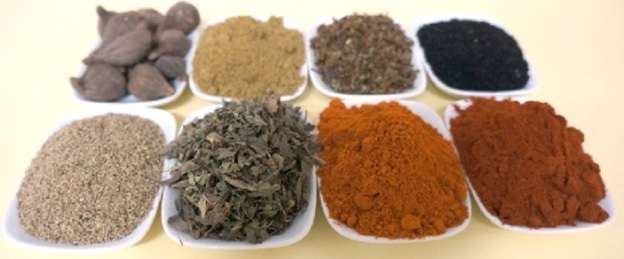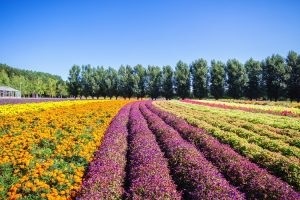
It is widely said that, the South West Ethiopia peoples’ region is blessed with natural resources. The natural resources include many crop products; fruits and vegetables, oilseeds, coffee, tea and spices.
Belay Ajuab, Director General of coffee, and tea and spices sector of the South West Ethiopian Peoples Region and Head of the Development and Conservation Sector said that, the region is blessed with nature and the environment is suitable for many crops, vegetables and fruits. It has also high potential in coffee, tea and spices production, which contributes significantly to the country’s foreign exchange earning. 560 thousand hectares of land is covered with coffee; more than 88,300 hectares of land is covered with spices and 2,776 hectares of land with tea cultivation.
According to Belay, four of the six zones in the region specialize in coffee in a different way and grow it as their main crop in view of the ecological suitability of the region for coffee, spices and tea products. He explained that extensive work is being done in the sector. As to him, more than half percent of the region’s 3.5 million people is involved in the development of coffee, spices and tea products.
In the region, coffee, spices and tea are not only widely produced, but the products are exported to the central market as well as foreign markets by working to increase production and productivity. This is contributing significantly to the country’s foreign exchange. He explained that, it has been planned to increase the national foreign exchange earnings and support the sector by increasing the production and productivity of coffee in quality and quantity.
As he said, in the 2022/23 fiscal year, the region has been doing extensive work to achieve the plan to collect 64.5 thousand tons of coffee and supply it to the central market. For example, work has been done to provide training to professionals and engage industrial owners through consultation with suppliers. With this, 65 % of the plan was achieved by supplying 42 thousand tons of coffee to the market.
The region planned to produce 47 thousand tons of spices and supply them to the central market in the fiscal year, and has managed to collect 43 thousand tons of produce and supplied them to the central market. He said that by achieving 90.9 % of the plan, it was able to record a better performance than coffee and tea. Belay said that, there is better activity in the field of tea cultivation than in the past. It was planned to provide seven thousand tons of tea production in the fiscal year and could able to achieve 89 % of the plan by providing more than 6,000 tons.
Belay mentioned that, the amount of coffee production recorded in the region during the fiscal year is low due to various problems. In particular, it has decreased by 35 % compared to the production amount in 2021/22 which was 64 thousand tons.
According to Belay, “If a coffee tree gives a good yield in consecutive years, it will experience a certain decrease in yield in the following year. This is natural. But beyond this, the region’s coffee caring work is not strong. Just like a mother who gave birth to twins needs good sustenance, better care especially to coffee that produces good yield is essential by giving fertilizers like compost and manure that can increase production and quality. It could be identified that there was a poor performance in this regard and lack of continuous work on the weeding.
Another reason why a large amount of coffee could not go to the market is related to the drop in the international price of coffee, Belay said. He stated that, this has not only had an impact as a country, but has also had a significant impact on the region. As a result, following the drop in international coffee prices, coffee vendors and farmers in the region refused to take the coffee to market and dumped at home in order to take it out when the price is improved. In this way, he observed that there is a large amount of coffee in storage. He also explained that in the last fiscal year, the region was less in quantity and could not supply coffee to the market as required due to other additional reasons.
While explaining about the production of spices, Belay said that the region could get better production but it is facing various problems as it has no legal framework. Lack of legal framework opened way to those who blend the products with strange things and taking it to the market. Such situation, as to him, stumble control mechanism and in turn, prohibits the supply of best product to the central market. He explained that the region has a very convenient and wide capacity for the production of various expensive spices, especially Korerima, so investors who want to participate in the sector will be welcomed to come to the region. The investors can be effective by expanding the development, adding value to the product and expanding the processing.
“The region has not been able to achieve 100% of the plan in the spice sector. It is because there is a large amount of illegal trade in the sector,” Belay said. There is a huge illegal trade in spice crop products especially those are expensive in the market, he added. In addition, regarding the quality of the product, he pointed out that there are actions to reduce the quality by rubbing it with soil and ash. For this reason, efforts will be made to prevent the problem with the legal framework that will be implemented in the future. Special attention will be paid on providing better production in the coffee, spices and tea sector via monitoring and controlling illegal trade and increasing production and productivity. .
Regarding tea production, Belay mentioned that it is being widely developed by two development organizations, especially in Kefa and Sheka zones. The tea production is being developed by development organizations called Wushwush and East Africa. There is a process by which the farmers around these development organizations can supply their products to the development organizations. However, there are problems that hinder the expansion of the coverage, and last year it was planned to increase the production coverage of tea to 27 hectares, but only five hectares of coverage could be increased.
He raised many obstacles for this mainly; lack of sufficient industries in the region prevented the production from expanding even by the farmers. Since the development organizations are exclusive and do not have competitive organizations, they buy the tea products from the farmers at a low price. This discourages the farmers and reduces their motivation. For example, the production of one kilogram of tea was five Birr until recently.
However, through discussion and explaining that the farmers do not cover even the cost of production, it could increase to around 25 Birr though it is not enough still. Belay further said that since the region has potential in tea production, it is necessary to solve the problems so that the product can be produced within the region’s capacity. For this, it is appropriate to establish different and competitive cottage industries in the region.
Referring to Kenyan experience, he said; “In Kenya, after the farmers have expanded the production of tea in their own fields, cottage industries are expanded and raising the harvest.” With this, there is a situation where Kenyans’ experience with tea is growing and the production is expanding.
It is necessary to process tea by expanding cottage industries so that Ethiopia can learn from this experience and use the country’s potential to get the benefits it deserves from the sector. If this is not the case, even if the farmer expands the production, there is no possibility to sell the product. In addition, tea production requires more processing than other crops and is not a type of crop that can only be produced and marketed without processing.
BY BACHA ZEWDIE
The Ethiopian Herald September 27/2023





